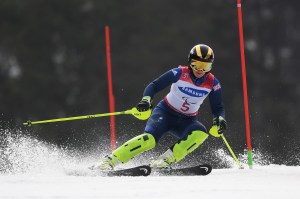Nothing puts trust, teamwork and communication into perspective like seeing Millie Knight, Britain’s first-ever Para Alpine world champion, and her guide, Brett Wild, soar down a mountain against incredible odds.
It’s an extraordinary partnership, and one we believe many business teams could do well to learn from. Millie started skiing on a family holiday at age six, shortly after losing sight in her left eye – having already lost sight in her right eye at age three. She is now among one of the best visually impaired Para Alpine skiers in the world, in partnership with her guide, Brett Wild.
Millie had the honour of carrying the British flag at the Opening Ceremony of the Paralympic Winter Games Sochi 2014 and she and Brett won two silvers and a bronze medal at PyeongChang 2018 and most recently won Great Britain’s first medal of the Paralympic Winter Games in Beijing 2022.
Before she travelled out to the Beijing 2022 Paralympic Games, we spoke with Millie and her guide, Brett, about their journey so far. We also spoke about the importance of having a symbiotic relationship with her guide, and how that affinity and understanding translates into trust, healing, and success.
A family holiday spurs a lifelong love
Millie’s lifelong passion for skiing began in 2005 on a family holiday shortly after losing her sight. A trip she looks back on fondly, recalling how her mum encouraged her to move past the shock and enjoy her life, no matter what changes.
“I fell in love with it right away. No, I adored it,” says Millie. “And it’s funny, I don’t remember losing my sight, but I do remember starting to ski.”
After a couple of years skiing recreationally, Millie’s natural talent led her to an indoor slope in Hemel Hempstead, where she met people involved with the British Para ski team who helped her realise she could pursue the sport professionally. She then attended a training camp where she was asked to join the team.
Fast forward to 2014, and Millie made her Paralympic Games debut in Sochi, where at just 15 years old, she became the youngest GB competitor at any Winter Paralympics.
“I was told I was on the longlist for the Paralympic Games, but not to get my hopes up,” says Millie. “And then I got a call on my 15th birthday saying I’d been selected. And because my birthday was on the qualification cut-off, I was the youngest competitor yet – it was awesome.”

Millie and Brett – a collaborative force to be reckoned with
Alpine skiing is a dangerous sport. The average speed in a Para Alpine event is 96kph, requiring unwavering focus, control, and awareness to stay safe. But for Millie who only has 5-10% of her peripheral vision in her left eye, and 5% in her right – and competes in the B2 Para Alpine classification – Alpine skiing is a team sport based on trust, friendship, and collaboration. When Millie hits the slopes, she’s joined by her partner Brett Wild who acts as her eyes, describing the terrain around her over a Bluetooth headset.
“Visually impaired skiing is a team sport,” says Brett. “I remember skiing alone in Scotland in awful conditions where you couldn’t see a thing. It was incredibly difficult – but every day for Millie is like that. Trust and communication are so important.” Brett is more than just Millie’s guide, but a close friend too – and one she tells us she was extremely lucky to find. Especially in the UK.
“Getting the right guide is very, very difficult,” says Millie. “The chances of finding somebody with the time, patience, experience, and communication skills for the job is unheard of in the UK. It’s such a unique skill set – and yet the hardest part is having to put up with me 24/7.”
Brett is also Millie’s ninth guide, and the commitment she had to find someone with the right skills and personality to make the guide relationship work is a testament to her passion and drive for success. As for Brett, Millie believes his aptitude for the job comes from his experience learning to communicate in the Royal Navy. He agrees.
“It’s funny, but guiding Millie is quite similar to my time as a planesman on a submarine,” says Brett. “I had to pass clear directions up to the bridge in a set order, and it had to be said perfectly. It’s much like telling Millie when to turn, roll, or come over – it must be clear and confident. If she doesn’t trust in what I’m saying, the results can be catastrophic.”
Both Millie and Brett also cite the trust born from their friendship as a reason why they’re one of the strongest guide and athlete relationships in the sport.
“You have to like your guide as a human being,” says Millie. “Poor Brett, he ended up being my sports psychologist, friend, mentor, ski coach and the person I trust when I’m terrified of throwing myself down a mountain.”

Fearlessness on the mountain
Fearlessness is a crucial athletic attribute, but that doesn’t make having a trusted support network any less important. And with Brett by her side, Millie has the support she needs to face her fears head-on.
“You have to be fearless,” says Millie. “As an athlete, you face so many challenges from all directions, but funnily enough, events like the Super-G – which is when I get most scared – is when I’m having the most fun and doing my best with Brett.”
It’s this fearless teamwork that also helped Millie return to the slopes following a series of unfortunate crashes, one of which took six months to recover from.
“I crashed at 120kph past the finish line in 2017, but we won gold,” says Millie. “And then four weeks later I crashed again in South Korea at the Paralympic test events. That’s when things got bad. It was just horrible.”
Millie knew something was off upon returning to ski camp in Chile six months later. Scared and upset, it was clear that she needed more time to heal. Instead of giving up, she worked with Brett and sports psychologists to overcome her fear and get back on her skis.
But then, a similar crash in early 2021 left Millie badly concussed and in hospital for three days. While another concussion could lead to her completely losing her sight, Millie again showed remarkable strength.
“I could’ve thrown in the towel,” says Millie. “But as hard as it is, you need that resilience to come back from injury. It’s the same for athletes who must balance their sport with jobs, university, and family obligations. It’s such an important trait.”
That’s why businesses like Salesforce support people facing some of the challenges touched upon by Millie, helping young talent grow their careers while balancing life’s many obligations.
Inspiring content from ParalympicsGB
Exceptional athletes like Millie Knight have so much to teach businesses about resilience, trust, and teamwork. And that’s one reason why we’ve partnered with ParalympicsGB and Team GB. To learn more about how you can turbocharge your resilience, we have 5 key takeaways to discover here.
























